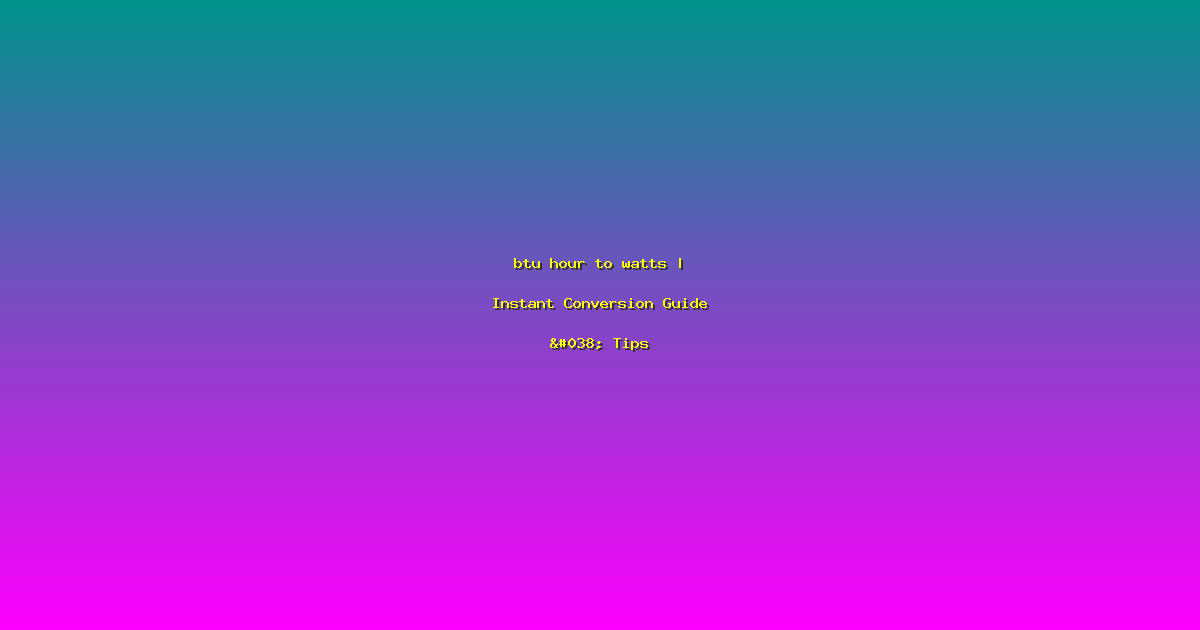btu hour to watts | Instant Conversion Guide & Tips
Ever found yourself in a situation where you need to convert BTU hours to watts but aren’t sure how? You’re not alone. Many people struggle with this conversion, especially when dealing with HVAC systems or energy efficiency calculations. This guide will walk you through the process, making it easy to understand and apply. Whether you’re a homeowner, a professional, or just curious, this article will provide you with the tools you need to convert BTU hour to watts with confidence. Let’s dive in and make this conversion a breeze.
Understanding BTU and Watts
Before we dive into the conversion process, it’s essential to understand what BTU and watts are. BTU, or British Thermal Units, is a measure of energy. One BTU is the amount of energy required to raise the temperature of one pound of water by one degree Fahrenheit. On the other hand, watts are a unit of power, representing the rate at which energy is used or generated. One watt is equivalent to one joule per second.
- BTU: A BTU is a measure of energy, commonly used in heating and cooling systems.
- Watts: Watts measure power, which is the rate at which energy is used or generated.
- Conversion: To convert BTU per hour to watts, you need to know that 1 BTU/hour is approximately equal to 0.293071 watts.
Why Convert BTU Hour to Watts?
Converting BTU hour to watts is crucial for several reasons. First, it allows for a more accurate comparison of energy usage across different systems. For example, if you’re comparing the efficiency of a heating system rated in BTU to an air conditioner rated in watts, you need to convert one to the other to make a fair comparison. Additionally, many energy efficiency standards and regulations are based on wattage, making this conversion essential for compliance.
- Comparison: Converting BTU to watts helps in comparing different systems.
- Regulations: Many energy standards are based on wattage, making this conversion necessary for compliance.
- Efficiency: Understanding the conversion can help in optimizing energy usage and reducing costs.
How to Convert BTU Hour to Watts
Converting BTU hour to watts is a straightforward process. The formula is simple: multiply the BTU per hour by 0.293071. For example, if you have a heating system that uses 10,000 BTU per hour, you can convert this to watts by multiplying 10,000 by 0.293071, which equals approximately 2,930.71 watts. This conversion is crucial for understanding the power output of your system in a more familiar unit.
- Formula: BTU per hour * 0.293071 = watts
- Example: 10,000 BTU/hour * 0.293071 = 2,930.71 watts
- Application: Use this conversion to compare and optimize energy usage in your home or business.
Frequently Asked Questions
How accurate is the conversion from BTU hour to watts?
The conversion from BTU hour to watts is quite accurate, with the conversion factor being 0.293071. This factor is widely accepted and used in the industry. However, it’s important to note that slight variations can occur due to rounding or specific equipment efficiencies. For most practical purposes, this conversion is reliable and sufficient.
Can I use this conversion for all types of energy systems?
Yes, you can use this conversion for most types of energy systems, including heating, cooling, and even some electrical appliances. However, it’s important to consider the specific context and efficiency of the system. For example, an HVAC system might have a different efficiency rating compared to an electric heater, so the actual energy usage might vary slightly.
What are the steps to convert BTU hour to watts?
The steps to convert BTU hour to watts are simple:
- Identify the BTU per hour rating of your system.
- Multiply the BTU per hour by 0.293071.
- The result is the equivalent wattage.
For example, if your system uses 12,000 BTU per hour, the calculation would be: 12,000 * 0.293071 = 3,516.852 watts.
Is there a difference between BTU and BTU/hour?
Yes, there is a difference. BTU is a measure of energy, while BTU/hour is a measure of power. BTU/hour indicates the rate at which energy is being used or generated over time. When converting BTU/hour to watts, you’re essentially converting a rate of energy usage into a rate of power output.
What are some common applications for this conversion?
Common applications for converting BTU hour to watts include:
- Comparing the efficiency of different heating and cooling systems.
- Calculating the energy usage of appliances and systems for budgeting and efficiency purposes.
- Meeting regulatory requirements for energy usage and efficiency.
Conclusion
Mastering the conversion from BTU hour to watts is a valuable skill for anyone dealing with energy systems. By understanding the relationship between these units, you can make more informed decisions about energy usage, efficiency, and compliance. Whether you’re a homeowner looking to optimize your energy bills or a professional working on energy-efficient systems, this guide provides the tools you need to convert BTU hour to watts with ease. Start applying these conversions today and see the difference in your energy management.
